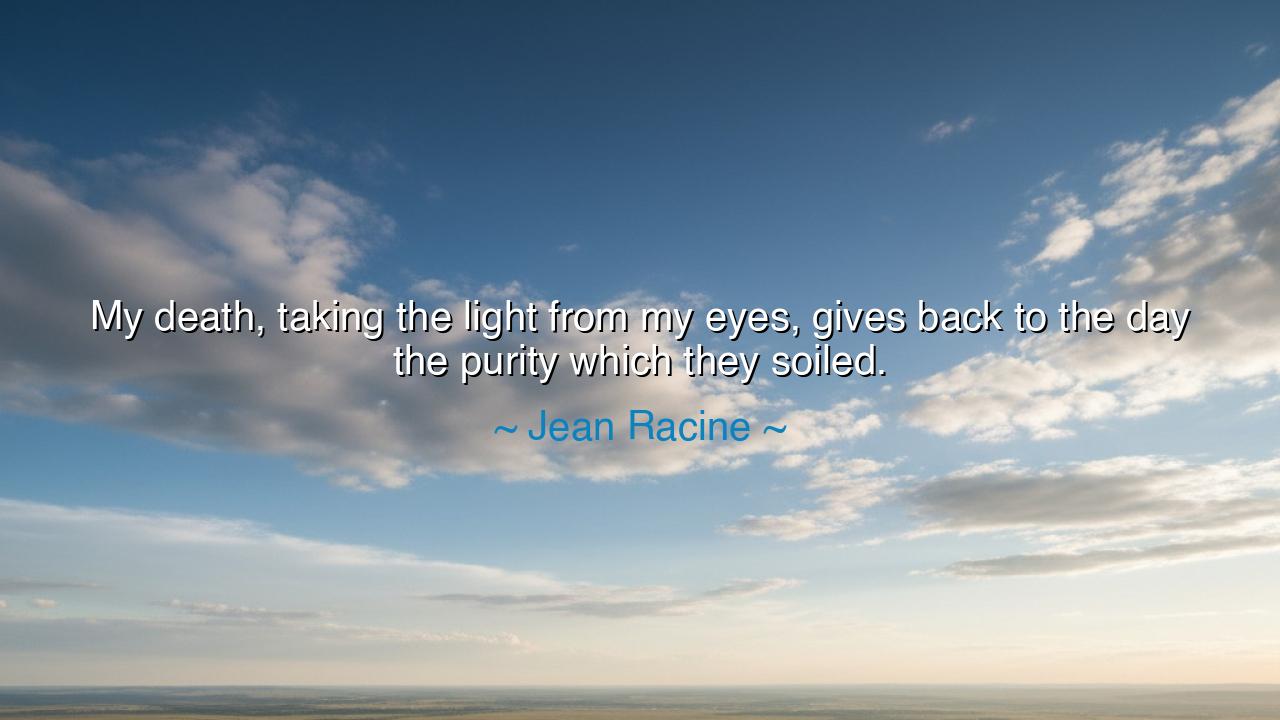
My death, taking the light from my eyes, gives back to the day
My death, taking the light from my eyes, gives back to the day the purity which they soiled.






The great tragedian Jean Racine, whose words could pierce the human soul like a finely tempered blade, once wrote: “My death, taking the light from my eyes, gives back to the day the purity which they soiled.” In this line, drawn from the depths of French classical tragedy, we hear not the despair of a man who fears death, but the humility of one who understands his own frailty. Racine, who gave voice to kings and queens consumed by passion and guilt, knew the tragic truth that to live is to err — and that only in death, when our eyes finally close to the illusions of pride and desire, can the world regain its original purity.
To understand this quote is to understand the tension between human imperfection and divine order, a theme that runs through all of Racine’s works. In his tragedies — Phèdre, Athalie, Andromaque — mortals are not villains but victims of their own hearts. They strive for love, power, or recognition, and in doing so, they disturb the harmony of the universe. So when Racine says that his death will “give back to the day the purity” his eyes “soiled,” he is acknowledging that human perception itself — clouded by desire, vanity, and ambition — corrupts the innocence of the world. To see is to covet; to live is to disturb. Only when sight fades, when the restless gaze of man is stilled, does the world breathe clean again.
It is a thought born of both classical tragedy and Christian humility. Racine lived in the seventeenth century, an age caught between reason and faith. His words reflect the influence of Jansenism, a strict moral philosophy that emphasized human sinfulness and the need for divine grace. In this spirit, his line can be read as a confession — an acknowledgment that even the artist, who seeks to illuminate truth, inevitably distorts it through the lens of his own imperfection. He speaks not as a judge of humanity, but as one of its penitents: “My eyes, that sought beauty, also polluted it. My understanding, that sought truth, also obscured it.” Thus, his death becomes not tragedy, but atonement — a return of the world to order.
History gives us many who have felt this same remorse before death. Marcus Aurelius, emperor and philosopher, wrote in his Meditations that the soul, at life’s end, should “depart from the body with simplicity, serenity, and goodwill — as an olive falls when ripe.” Like Racine, he saw death not as punishment, but as purification, a natural release from the stains of living. And centuries later, Leo Tolstoy, after a life of moral turmoil, fled his wealth and fame, seeking death in a railway station, murmuring that only in letting go of the self could one find peace. Such souls understood what Racine’s line captures with crystalline sorrow: that our presence, though bright, inevitably casts shadows — and in our leaving, the world regains its dawn.
Yet Racine’s words are not an invitation to despair, but a call to humility. He does not curse his life; he sanctifies it by recognizing its limits. He tells us that our vision, though powerful, is never pure — that every human act, no matter how noble, carries imperfection within it. And yet, by acknowledging that truth, we become free. For what greater wisdom is there than to see one’s flaws clearly, to walk through the world aware of one’s shadow, and to leave it lighter than when one entered? In this way, Racine’s reflection becomes not a lament for death, but a blessing for life — the recognition that even our faults are part of the divine balance.
Consider also that Racine was a dramatist — a creator of worlds, of light and illusion. Perhaps, in this line, he also speaks as an artist weary of his own power to manipulate emotion. His “eyes” are those of the poet, and their “soiling” is the price of creation itself. To invent tragedy is to meddle with the sacred — to expose human weakness, to stir passions that might best remain asleep. In death, then, the artist returns what he borrowed: the light of creation, the fire of inspiration, the trembling vision that shaped beauty and despair. He leaves the stage, and the day resumes its quiet purity.
And so, the lesson is this: live as one who knows he is a guest in the world, not its master. Look upon beauty with gratitude, not possession. Seek truth, but know that truth is larger than you. When your eyes grow weary, let them close in peace, knowing that your imperfections, your sorrows, and your loves were part of the vast rhythm that keeps the universe alive. For the day will outlast you, and the light you thought you stole will return to the heavens untainted.
Thus, when Jean Racine writes of death restoring purity, he teaches not how to die, but how to live — with reverence, awareness, and grace. He reminds us that every act of creation, every gaze cast upon the world, carries both blessing and burden. Yet when we live with humility, when we accept the dust upon our eyes and still seek to see, then our final closing of them will not be loss, but restoration — a giving back of light to the day from which we borrowed it.






AAdministratorAdministrator
Welcome, honored guests. Please leave a comment, we will respond soon